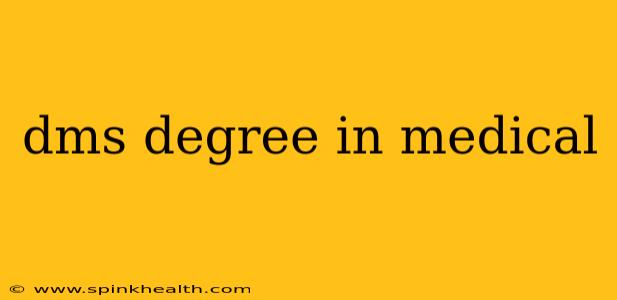The world of medical education is vast and multifaceted. For those aspiring to a career in the healthcare field, understanding the different pathways and qualifications is crucial. One such pathway, often shrouded in some mystery, is the DMS degree. This isn't a standardized, universally recognized acronym like MD or DO, but rather a shorthand used in specific contexts within medical education. Let's unravel the nuances and delve into what a DMS degree might represent, exploring various possibilities and clearing up any confusion.
The term "DMS" in relation to medical degrees isn't a standard abbreviation recognized by major medical bodies. Its meaning depends entirely on the specific institution or program using it. It might refer to various programs, depending on the context, such as Doctor of Medical Science or even a Diploma in Medical Sciences. Therefore, a deeper investigation into the specific institution granting the degree is crucial for accurate interpretation.
What does DMS stand for in medical terms? (Different possible meanings)
This is the most common question surrounding the DMS acronym. There's no single definitive answer; it truly depends on where you encounter it. Here are some potential interpretations:
1. Doctor of Medical Science (DMS):
This is perhaps the most likely meaning. A Doctor of Medical Science (DMS) is an advanced postgraduate degree, usually a research-focused doctorate. It's distinct from a medical doctorate (MD or DO) aimed at clinical practice. Instead, a DMS prepares individuals for careers in medical research, teaching, and leadership roles within healthcare organizations. This path is ideal for those with a passion for advancing medical knowledge and contributing to the scientific community. Think groundbreaking research, analyzing data, and pushing the boundaries of medical understanding.
2. Diploma in Medical Sciences:
Some institutions might use DMS to denote a diploma or certificate in medical sciences. This is generally a shorter program than a full doctorate and might focus on specific areas of medical science, like medical laboratory technology or public health. These programs may be designed as stepping stones towards further education or to enhance existing skills in healthcare professions.
3. Other Less Common Interpretations:
In some rare cases, DMS might be an institution-specific abbreviation with a unique meaning. It is crucial to always refer to the institution's official website or program descriptions for clarification. The context in which you encountered the acronym will often provide clues.
Is a DMS degree recognized internationally?
The recognition of a DMS degree hinges entirely on the institution granting it. A DMS awarded by a prestigious and reputable university will generally have more international recognition than one from a less-established institution. Always verify the accreditation status of the institution and the program to understand the potential international recognition. This will be crucial if you plan to work or practice in countries outside your home country.
What are the career prospects with a DMS degree?
The career path for someone with a DMS will largely depend on the specific focus of their degree. As previously noted, a research-focused Doctor of Medical Science will likely lead to opportunities in academia, research institutions, or pharmaceutical companies. A DMS representing a diploma or certificate will open doors within healthcare settings, commensurate with the program's specialization.
What is the difference between a DMS and an MD/DO degree?
This is a vital distinction. An MD (Doctor of Medicine) or DO (Doctor of Osteopathic Medicine) is a professional degree preparing individuals for the practice of medicine – diagnosing and treating patients. A DMS, in its research-focused iteration, is primarily an academic degree focused on contributing to medical knowledge through research and scholarship, not direct patient care. Think of it as a more research-oriented pathway within medicine.
How long does it take to complete a DMS program?
The duration of a DMS program varies widely depending on the degree and the institution. A research-focused Doctor of Medical Science can take several years to complete, often involving extensive research, dissertation writing, and other academic requirements. Diplomas and certificates generally require shorter study periods.
In conclusion, the meaning of "DMS" in the medical field lacks universal standardization. Understanding the specific institution and program behind the abbreviation is paramount. Always research thoroughly to fully grasp the meaning and implications of any medical degree, including this one, ensuring it aligns with your career aspirations.

